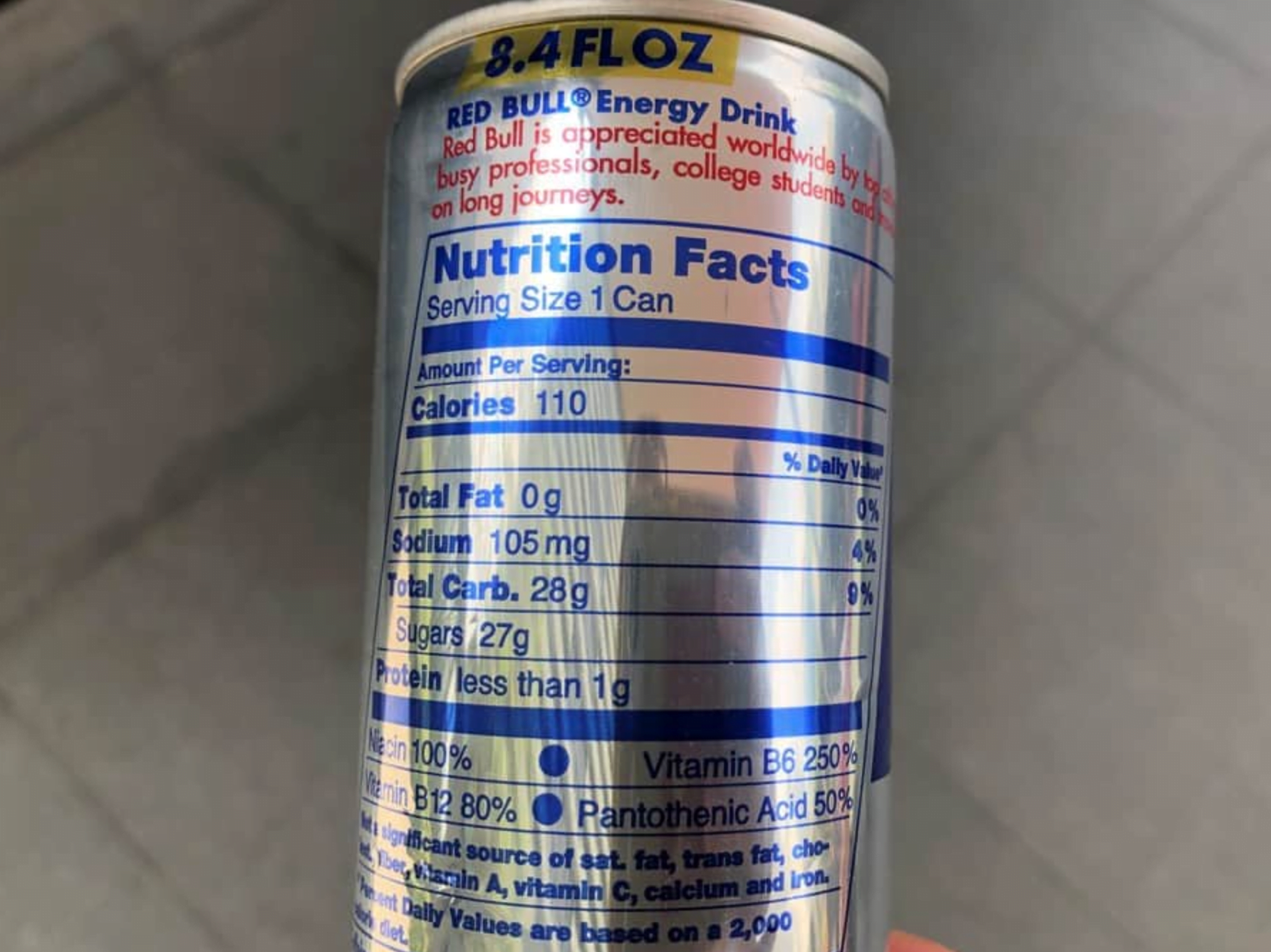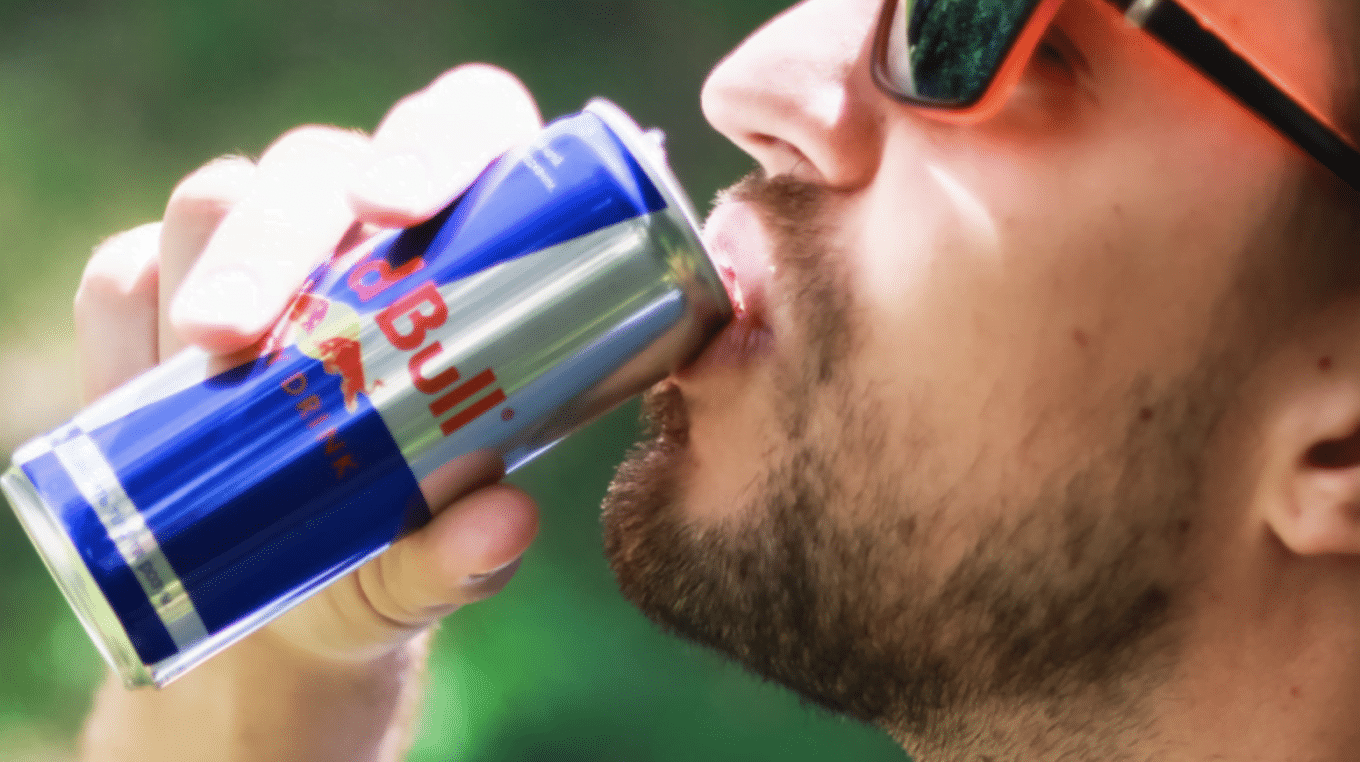Have you ever wondered how long the energy boost from a can of Red Bull lasts? Many people rely on energy drinks like Red Bull to help them power through a long day at work, a late night of studying, or an intense workout.
But what exactly is in Red Bull that provides this jolt of energy, and how long do the effects last?
This article will better investigate the science behind this popular beverage to understand its short-term and long-term impacts on the body.
It will break down the key ingredients in Red Bull, explain how they work to give you energy and reveal just how long you can expect that energy to last based on scientific research.
By the end of this article, you will be equipped with knowledge about the Red Bull drink. Let us begin!
The Key Ingredients Behind the Energy Boost

Let’s break down the key components that give Red Bull its signature energy-boosting effects:
1. Caffeine: The Primary Energy Driver
- Red Bull contains 80mg of caffeine per 8.4 fl oz can.
- Caffeine stimulates the central nervous system, boosting alertness and reducing fatigue.
- It also increases dopamine levels, enhancing mood and cognitive function.
2. Sugar: A Quick Energy Source
- A single can of Red Bull contains 27g of sugar, typically glucose and sucrose.
- Sugar provides a rapid source of energy by raising blood glucose levels.
- However, excessive sugar intake can lead to energy crashes and potential health risks.
3. B-Vitamins: Essential for Energy Metabolism
- Red Bull is fortified with B vitamins, including B3, B5, B6, and B12.
- B vitamins play a crucial role in converting food into energy.
- They support the proper functioning of the nervous system and help reduce fatigue.
4. Taurine: An Amino Acid with Potential Benefits
- Red Bull contains 1000mg of taurine per can.
- Taurine is an amino acid that may improve athletic performance and reduce muscle damage.
- However, more research is needed to understand its effects fully in energy drinks.
While these ingredients work together to provide a temporary energy boost, it’s important to consider the potential drawbacks of relying on energy drinks like Red Bull for daily energy needs.
Duration of Red Bull’s Energizing Effects
Now that we understand the key ingredients behind Red Bull’s energy boost let’s explore how long these effects typically last.
Average Duration: 1-4 Hours
- The energy-boosting effects of Red Bull usually kick in within 15-45 minutes of consumption.
- Most people experience peak energy levels around 30-60 minutes after drinking Red Bull.
- Depending on individual factors, the effects generally last between 1-4 hours.
Factors Affecting Duration
- Metabolism: People with faster metabolisms may experience shorter-lasting effects.
- Caffeine Tolerance: Regular caffeine consumers may build up a tolerance, reducing the duration of effects.
- Body Weight: The effects may last longer in individuals with lower body weight.
Consuming on an Empty Stomach
- Drinking Red Bull on an empty stomach can speed up the absorption of caffeine and other ingredients.
- This may lead to a faster onset of energy-boosting effects.
- However, it can also increase the risk of side effects like jitters and energy crashes.
Other Factors to Consider
- Alcohol Consumption: Mixing Red Bull with alcohol can mask the effects of alcohol, leading to excessive drinking and potential health risks.
- Sleep Deprivation: Red Bull should not be used as a substitute for sleep, as it can disrupt natural sleep patterns and lead to insomnia.
While Red Bull can provide a temporary energy boost, it’s crucial to be mindful of the duration of its effects and the factors that can influence how long the energy lasts.
Potential Health Risks of Frequent Consumption
Let’s delve into the potential risks associated with frequent Red Bull intake.
1. Caffeine Overdose
- Consuming multiple cans of Red Bull within a short period can lead to caffeine toxicity.
- Symptoms may include restlessness, anxiety, rapid heartbeat, and insomnia.
- In severe cases, caffeine overdose can result in seizures and cardiac arrhythmia.
2. Increased Sugar Intake
- Regular consumption of Red Bull can contribute to a significant increase in daily sugar intake.
- Excessive sugar consumption is linked to obesity, type 2 diabetes, and cardiovascular disease.
- The sugar content in Red Bull can also lead to tooth decay and dental erosion.
3. Dehydration and Electrolyte Imbalance
- The caffeine in Red Bull has a diuretic effect, increasing urine production and potentially leading to dehydration.
- Excessive Red Bull intake can disrupt the body’s electrolyte balance, especially during exercise.
- This can result in symptoms such as muscle cramps, fatigue, and impaired cognitive function.
4. Sleep Disruption
- Consuming Red Bull, especially in the later hours of the day, can interfere with normal sleep patterns.
- The caffeine content can make it difficult to fall asleep and reduce overall sleep quality.
- Chronic sleep disruption can lead to mood changes, impaired memory, and weakened immune function.
5. Addiction and Dependence
- The combination of caffeine and sugar in Red Bull can create a cycle of energy highs and lows.
- This can lead to a psychological dependence on the drink to maintain energy levels throughout the day.
- Withdrawal symptoms, such as headaches, fatigue, and irritability, may occur when attempting to cut back on consumption.
6. Interaction with Medications
- The ingredients in Red Bull can interact with certain medications, such as antidepressants and antibiotics.
- These interactions can lead to increased side effects or reduced effectiveness of the medications.
- It’s crucial to consult with a healthcare professional about potential interactions before consuming Red Bull.
While occasional consumption of Red Bull is unlikely to cause serious harm, frequent and excessive intake can have detrimental effects on both short-term and long-term health. Moderation and awareness of the potential risks are key to making informed decisions about energy drink consumption.
Red Bull and Physical Performance

As a sports nutritionist, I’m often asked about the impact of energy drinks like Red Bull on athletic performance. Let’s explore the potential benefits and risks associated with consuming Red Bull in the context of physical activity.
Potential Benefits
Red Bull can offer potential benefits for athletic performance. Its caffeine can enhance endurance and reduce perceived exertion during exercise, while its taurine content may improve muscle contractility and protect against muscle damage.
Red Bull’s sugar provides a quick energy source for high-intensity activities.
Improved Cognitive Function
In addition to its physical benefits, Red Bull can also improve cognitive function during sports. The caffeine can improve reaction time, alertness, and decision-making, which can be particularly beneficial in sports that require rapid responses and strategic thinking.
However, excessive caffeine intake can lead to jitters, anxiety, and impaired coordination.
Risks and Drawbacks
Despite the potential benefits, Red Bull consumption for athletic performance has risks and drawbacks. The sugar content can cause gastrointestinal distress during intense exercise, and consuming Red Bull before or during prolonged exercise may lead to dehydration due to its diuretic effect.
Additionally, the energy boost from Red Bull is temporary and can be followed by an energy crash, which can negatively affect performance.
Alternatives for Athletes
Many athletes opt for sugar-free or low-calorie Red Bull to minimize the risks associated with high sugar intake. However, these versions still contain caffeine and other stimulants.
Natural alternatives, such as coconut water or beetroot juice, can provide hydration and nutrients without the added risks.
The Importance of Moderation
While Red Bull can offer some performance benefits, it should not be relied upon as a sole energy source. For optimal performance, athletes should prioritize a balanced diet, proper hydration, and adequate rest.
Consulting with a sports nutritionist can help develop a personalized fueling plan incorporating safe and effective energy sources while emphasizing the importance of moderation when consuming energy drinks like Red Bull.
Lifestyle Tips: Balancing Red Bull Intake
Balancing Red Bull intake to minimize potential risks can not be emphasized enough. Here are some practical tips for consuming Red Bull more mindfully.
1. Moderation is Key
Moderation is key when it comes to consuming Red Bull. Limit your intake to no more than one can per day and avoid consuming it daily to prevent dependence and potential health risks.
Be mindful of caffeine intake from other sources, such as coffee or tea, to avoid overloading your system.
2. Stay Hydrated
Staying hydrated is crucial when drinking Red Bull. Drink plenty of water throughout the day to counteract the beverage’s diuretic effects. Aim to consume at least 8 ounces of water for every 8 ounces of Red Bull consumed.
Add electrolyte-rich drinks like coconut water to your diet to maintain proper hydration.
3. Timing Your Intake
Timing your Red Bull intake is important for minimizing potential side effects. Avoid consuming it on an empty stomach to reduce the risk of gastrointestinal distress.
Limit your intake to earlier in the day to reduce the impact on sleep quality, and avoid consuming Red Bull at least 6 hours before bedtime to allow the effects of caffeine to wear off.
4. Post-Consumption Nutrition
Post-consumption nutrition plays a role in managing Red Bull’s effects. Avoid consuming high-fiber foods immediately after drinking Red Bull to prevent digestive discomfort.
If you’re consuming Red Bull between meals, choose easily digestible snacks, such as bananas or yogurt. Prioritize a balanced diet rich in whole foods to support overall health and energy levels.
Conclusion
In this article, we’ve explored the science behind Red Bull’s energy-boosting effects and answered the question, “How long does a Red Bull last?”
We’ve discovered that Red Bull’s key ingredients work together to provide a temporary energy boost lasting 1-4 hours, with factors like consuming it on an empty stomach potentially speeding up the onset of effects.
However, frequent and excessive consumption can lead to health risks such as caffeine overdose, increased sugar intake, and sleep disruption.
Understanding the duration of Red Bull’s effects and the factors influencing them can help you make more informed decisions about your energy drink consumption.
While Red Bull can provide a temporary boost, it should not be relied upon as a long-term solution. Instead, focus on adopting a balanced lifestyle that includes regular exercise, a nutrient-rich diet, adequate sleep, and effective stress management techniques.
If you consume Red Bull, be mindful of your intake, listen to your body, and explore healthier alternatives if needed.




